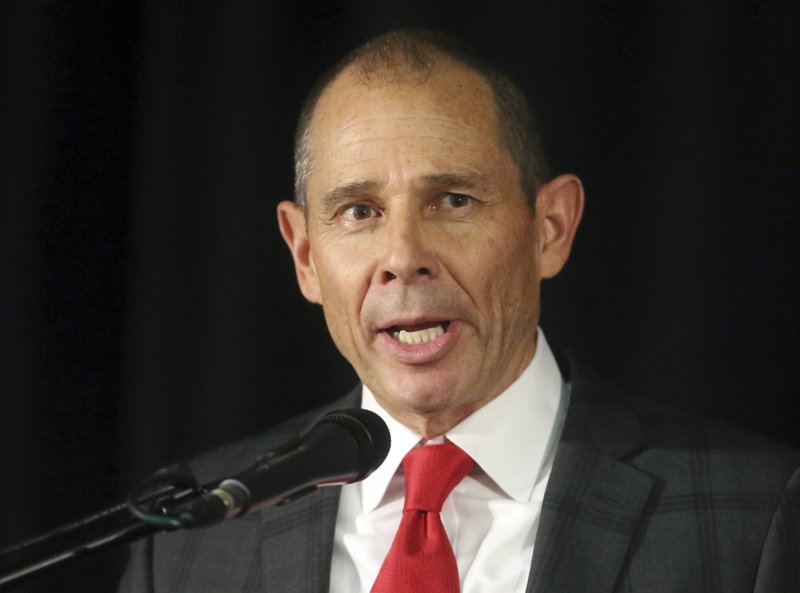SALT LAKE CITY -- The mayor in the Mormon stronghold of Provo won a three-way Republican primary Tuesday in the race to replace former U.S. Rep. Jason Chaffetz, putting him on track to clinch the congressional seat in the general election in the overwhelmingly GOP district.
John Curtis pulled off the win despite being dogged by attack ads in a race whose three candidates were emblematic of the divisions roiling the GOP under President Donald Trump.
Curtis is a former Democrat who was the most moderate of the Republican candidates running in Utah's 3rd Congressional District. Utah's governor and other moderate Utah Republicans backed Curtis, the only one of the three Republican candidates who didn't vote for Trump last year.
Republicans further to the right split their support behind the other two GOP candidates -- Chris Herrod, a former state lawmaker known for strict immigration positions, and Tanner Ainge, a business consultant, first-time candidate and son of Boston Celtics President Danny Ainge. Despite their disagreements on Trump, all three candidates say they support the president's agenda -- including plans to build a wall along the U.S.-Mexican border, revamp the tax code and repeal the Patient Protection and Affordable Care Act.
Curtis only needed a plurality of votes to win, and as of late Tuesday he was leading with just over 40 percent of the vote. Herrod was trailing with about 31 percent, and Ainge called Curtis to concede the race even before Curtis was declared the winner.
Chaffetz abruptly resigned from the seat in June, citing a desire to spend more time with family. The five-term Republican carved out a reputation for using the House oversight committee he chaired to run aggressive investigations of Hillary Clinton before the 2016 presidential election.
His departure opened up a congressional seat in a district where Republicans outnumber Democrats 5-to-1 and in an area that stretches from the Salt Lake City suburbs and several ski towns southeast to Provo and Utah coal country.
Out-of-state organizations and political action committees spent about $900,000 in Utah's race -- on top of about $600,000 in campaign contributions collected by the three GOP candidates.
Outside spending of that magnitude is generally only seen in heavily Republican Utah when Democrats and Republicans face off in an occasional close race.
Curtis, the target of most of the out-of-state attack ads, faced suspicion and criticism from some Republicans for his 2000 run as a Democrat for the state Legislature and his time leading a county Democratic Party. The 57-year-old identifies today as a conservative Republican and points out that Ronald Reagan, Trump and Chaffetz were all Democrats at one point.
For Ada Wilson, a 59-year-old Republican homemaker from Orem, Curtis' stint across the aisle was one of the reasons for voting for him. Wilson said it shows Curtis can work in a bipartisan way to get things done.
"I think he acknowledges that being Republican with an 'R' by your name does not automatically make you a keeper of all the answers," she said.
Martin Wilkins, a 39-year-old UPS worker from Orem, said Ainge, 33, seemed like a nice guy but is too young and inexperienced.
"In the political world, he's just a kid and no one is going to listen to him," Wilkins said. "If you go into college and a kindergarten student starts trying to order people around, no one is going to listen."
Wilkins said he voted for Herrod because he seems straightforward, whether or not what he's saying is popular.
After Chaffetz announced his retirement, he took a role as a Fox News commentator and announced that he will be one of six visiting fellows at Harvard University this fall.
His announcement made what would have been a quiet municipal election day in which counties were conducting their first mail-in voting into a more complicated affair, and there were problems with unaffiliated voters receiving ballots that should have gone only to Republicans.
Election officials explained that unaffiliated voters could vote in the primary if they went to the polls and registered as Republicans on election day. Unaffiliated votes for Republican candidates weren't to be counted.
Elections director Mark Thomas said Tuesday evening that polling places weren't busy, though he noted that about 22 percent of registered Republican voters had cast early ballots. Voter turnout was 33 percent during last year's GOP primary.
Curtis will face a well-funded Democratic opponent who initially jumped in to challenge Chaffetz earlier this year. Kathryn Allen socked away more than a half-million dollars after she called out Chaffetz early this year for his comments suggesting people should spend money on health care instead of iPhones.
Several third-party candidates are also running in November, including Jim Bennett, the son of the late former U.S. Sen. Bob Bennett, a longtime Republican who lost re-election in 2010, the first of several GOP candidates ousted in tea party wave. Jim Bennett is running as the first candidate of a new centrist party, the United Utah Party.
Information for this article was contributed by Brady McCombs of The Associated Press.
A Section on 08/16/2017
